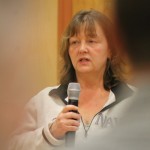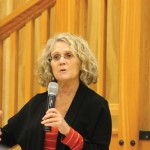The board of the McBride Community Forest Corporation is working on the overcutting situation, but can’t yet give the green light to start logging again.
The board of the McBride Community Forest (MCFC) hired consultants to review the organization after letting the manager go in August. Jeff McWilliams of B.A. Blackwell and Associates says the first thing they walked into when they arrived was the board realizing the MCFC was substantially overcut. In the first three years of the current cut control period, starting in 2012, the MCFC had cut 243,000 cubic meters – about 90,000 over the allowance for those years.
“I don’t want to be too judgemental, but it is a serious situation,” said McWilliams at a public meeting on Sept. 30th. “There is a certain biological capability of a forest to sustain a yield in perpetuity. That is a central concept of forest management.”
He describes the past planning practises of MCFC as “risky.”
The MCFC board put a halt to logging after realizing the overcutting. This led to at least 15 layoffs at local mills.
Some have called the MCFC to make a quick decision to re-start logging, but McWilliams says it will take time.
“If you don’t have plans in place, you don’t have any options. That is unfortunately where we sit,” said McWilliams, He says the situation is not unsolvable, but it’s going to take some work.
The sustainable harvest for MCFC is 50,000 cubic meters a year, and McWilliams explained briefly how the cut control period works. There is an allowance built in to every 5 year period; you are allowed to go over that by 10 per cent, but you face financial penalties. Also, you have to eventually balance the cut – you have to take that extra volume out of your next cut period.
McWilliams explained a few things the board and his company are working with the District Forest Manager on to try to reduce the overcut assessment. He gives credit to Jim Sales of the Ministry of Forests, Lands and Natural Resource Operations for being sympathetic and helpful with remedies that could address the issue. The first thing they’ve done is asked for a termination of the cut control period. That restarts the 5-year clock at the beginning of 2015, but the overcut of about 90,000 gets carried forward.
McWilliams said there was a substantial waste assessment – about 34,000 cubic meters of usable wood that was not used – levied against MCFC. That means fines and it also counts against the cut allocation. He says the ministry eventually agreed the fines were not appropriate, but the board still needs to make the case that the volume should be taken off their cut. He says MCFC can also apply for a Grade 4 cedar exemption for about 8,000 cubic meters. Approval of both exemptions could reduce the overcut by about 42,000.
“Every extra cubic meter you cut you are liable for potential financial liability; and that is a meter you won’t be able to cut next year,” says McWilliams. Worse than that, the company has immediate concerns for the planning practices of MCFC.
“Concern was literally confirmed right away with the discovery of a violation of a riparian reserve zone in an active cut block,” said McWilliams at the meeting. “That substantiates what I would call risky planning practices.”
“The day the auditors walked in the door we found out how bad the overcut was,” said Mayor Loranne Martin after the meeting. And at the same time they were made aware of BKB Cedar’s dire need for fibre, which has resulted in the layoff of 15 employees at the mill. But any logging would have compounded the problem, says Martin.
McWilliams says they were originally called in to provide advice in the absence of a manager in order to meet current needs. The review is not finished because they’ve been tied up with other issues, but he says they were concerned right away with the planning practices in their initial review – everything from how cut blocks were developed, referred to the public, agencies, and other people who have rights to the forest, through to how blocks are developed, planned, engineered and laid out, and how other values like visuals and fish-bearing creeks are protected. Their concerns were confirmed when they found a riparian reserve zone being logged.
Mayor Martin confirmed the MCFC has self-reported to the ministry on two recent issues – a slide on Skinner Road this summer and new harvesting in a riparian reserve area. She says B.A. Blackwell found that a stream was misclassified, and as a result, part of a riparian reserve zone was harvested. Stream misclassification was also part of a decision against MCFC released in March 2015, regarding two earlier incidents of logging within riparian reserve zones.
The auditors have recommended the board does not approve logging again until the blocks are completely reviewed, which may include public input in some cases.
One resident asked at the meeting when the next timber supply review for the area would be done and if there was any of the cut left for new community forest licenses. One of the auditors confirmed with the ministry via text messaging that the next timber supply review is not for another 9 years, and the cut is fully allocated, though there is a reserve volume that may be available.
Bryan Monroe voiced concerns about areas like the West Twin, and asked when the public would be involved in the Carrier deal. Mayor Martin said the board is reviewing the new areas proposed as part of the agreement that would see the Valemount and McBride community forests purchase one of Carrier Lumber’s licenses, and then apply to convert the volume licenses into new community forest agreements. She said they are looking especially at areas with more difficult terrain, and confirmed the agreement will go to public consultation once they’ve finished their review.
“We are literally picking our fights and priorities one at a time, trying to get through them quickly,” said Martin after the meeting. “We are still looking immediately at the Carrier deal,” she said, but they need to ensure that potential liabilities – like silviculture, road and bridge construction – are understood, and that proper inspections have been done.
At the meeting, Raj Basran, owner of BKB Cedar, said he was satisfied with the work B.A. Blackwell has been doing as to why there is no cedar available, but wanted to explain why his mill is important.
“I think everyone gets it,” said Susan Mulkey of the BC Community Forest Association. She was brought in with B.A. Blackwell to share some best practices and advise how to move forward.
Basran said he has a simple solution, though he says he may not know all the issues. After the meeting, Mayor Martin said Basran was recently asking for Block 29 to be harvested, but she says there are a number of issues with it. It is very close to Martinson Creek which has 35 water users who would have to be consulted. It is close to three watersheds, and also cattle grazing so it would need fencing, and a number of other issues that at the very least would take considerable time to deal with before logging could start.
Martin said there is some cedar available on Block 23, in the Crescent Spur area, and she understands the loggers responsible for the area have contacted Basran, but the board would still have to sign off on any logging. She says they are working on a short term plan that will give them time to deal with and address some of the longer term priorities. She said the reset of the cut control period gives them the ability to log in 2016, but there are a number of issues to be sorted out before the board gives the OK.
Mulkey said it was great to see so many people at the meeting (well over 100), and says they’ve already received valuable, informative and passionate feedback from the community, and are looking for more, including a short survey available at the meeting and on the MCFC’s website until Oct. 7th.
“We’re a ship on stormy seas right now,” said Mulkey. “Tonight is about starting to move forward. It’s not a condemnation on past practices. There is common ground here tonight – you are all here.”
“It’s reality check time,” said Mulkey. The issues built up over time and will take some time to resolve, and it could take six months, she said, so some interim measures are needed. She says the survey is the start of addressing governance issues with MCFC, and both she and B.A. Blackwell will continue to welcome input and discussion.
Martin says the board was advised not to hire an interim manager until the review is complete.
One thought on “McBride Community Forest “a ship on stormy seas:” consultant”
Comments are closed.







what a miserable failure its time to shut MCF down the forest in the valley are more valuable standing then being logged also in this day and age time to end ALL old-growth logging now MCF doesn’t deserve to buy Carriers licence in fact its time to end all logging in the valley!